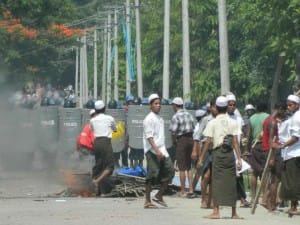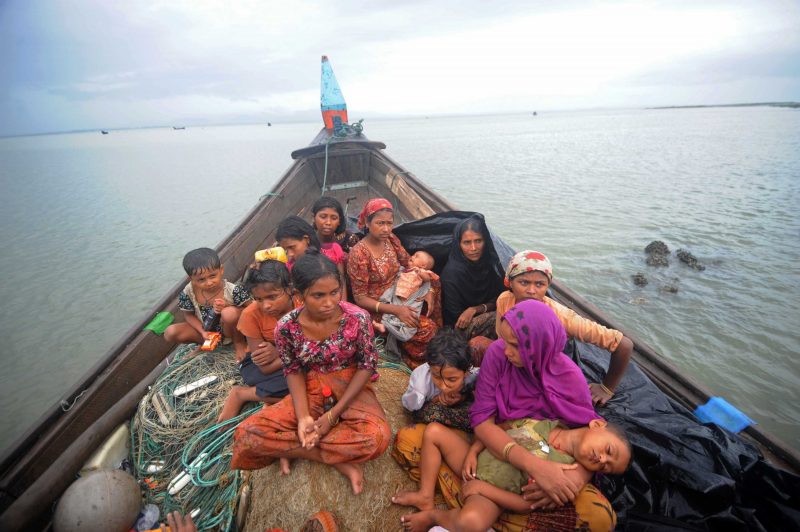More than 1,000 persecuted Muslim Rohingyas from Myanmar (Burma) and about 800 people from Bangladesh, most of them seeking better lives in Malaysia or Australia, have ended up in Indonesia over recent weeks. Thousands more are waiting on crowded boats at sea. The Government and the Association of Southeast Asian Nations (ASEAN) will struggle to find a lasting solution to the crisis.
ASEAN’s long-held policy of non-intervention within member states is partly to blame for the current refugee crisis. Mostly to blame though is Myanmar’s military-backed government, for failing to protect or even recognise its own citizens.
Myanmar’s generals, keen for international business dollars, have been on a plodding path toward democratisation since late 2010, following decades of military rule. The latest exodus of refugees stems from the long-standing oppression of the ethnic Rohingya Muslims. These are people whose ancestors came from neighbouring Bengal (which is now mostly Bangladesh) to the northeastern Burmese coastal state of Arakan (now called Rakhine). Many were encouraged to move there as agricultural labourers when Britain ruled Burma as a province of India from 1826–1948. Burmese Buddhists opposed the Muslim migrants, resulting in ethnic tensions that continue to this day.
Rohingyas have been denied citizenship in their own country since 1982. Myanmar classifies them as stateless Muslims from Bangladesh. Persecution of Rohingyas is state policy and thousands have been expelled. In June 2012, three Muslim men raped and murdered an ethnic Rakhine Buddhist woman, sparking ethnic clashes that killed about 150 people and left over 100,000 Rohingyas displaced.

In the aftermath of the riots, many Rohingyas fled southward on boats, paying people smugglers to take them to Malaysia, where they hope to work illegally. A major stop-off point was the jungle-covered border area between southern Thailand and northern Malaysia.
Thai people smugglers kept the refugees and economic migrants in appalling conditions, holding them prisoner and demanding their families pay ransoms of up to US$2,000. Those whose families could not pay were beaten and/or starved. Females were allegedly raped. Thai authorities suddenly cracked down on the overland smuggling in early May, after the discovery of mass graves of refugees. This was followed by discoveries of mass graves on the Malaysian side of the border. Human rights groups say military officials must have been complicit in the prison camps.
The crackdown prompted people smugglers to abandon possibly as many as 7,000 migrants in crowded boats. Indonesia and Malaysia initially refused entry to boats that arrived and instead provided them with water and provisions, before turning them back. Australian Foreign Minister Julie Bishop said Indonesia believes that most of those stranded at sea are illegal labourers from Bangladesh and not genuine Rohingya asylum-seekers. Indonesian Foreign Affairs Ministry spokesman Arrmanatha Nasir later said almost 50% are economic migrants from Bangladesh.
Fishermen from Indonesia’s Aceh province on the northern tip of Sumatra have rescued hundreds of emaciated and diseased migrants from some boats. Others have swum ashore. Survivors recounted deadly fights over insufficient food and water supplies as they drifted at sea for weeks or even months.
The Indonesian Government last week said it would accept some refugees for up to a year, provided the international community supplies financial support. Social Affairs Minister Khofifah Indar Parawansa said the Government has so far allocated Rp.2.3 billion (US$175,000) to provide the refugees with tents, medical care and food.
She said the assistance is only for the Rohingyas, whereas about 800 Bangladeshis would be sent home within weeks because they are economic migrants. Indonesia is now working with the International Organization of Migration and the United Nations Refugee Agency to ascertain who can stay and who should be sent home.
Coordinating Minister for Political, Legal and Security Affairs Tedjo Edhy Purdijatno warned of future social and economic problems if Indonesia accepts thousands of boatpeople. “We help the Rohingyas in the spirit of humanity. Those who have entered, we are looking after them well. But that does not mean that we should invite those who are still at sea. Not so.”
Poor Indonesians would become jealous, he said, if they see idle migrants being supported and fed for a long period of time. He said the Government is considering whether to house the refugees already here on an island.
Indonesia’s National Agency for Disaster Management last week put the number of recently arrived refugees at 1,810, comprising 1,328 men, 244 women and 238 children.
They are spread across six shelters in Aceh, while 96 are in the North Sumatra capital of Medan.
Several Islamic boarding schools in West Java and East Java have offered to adopt any Rohingya orphans in Indonesia. Some Islamic groups have been raising funds for the exiles. Speaker of the People’s Consultative Assembly Zulkifli Hasan, a former forestry minister, last week spent Rp.5 million on seven garish agate rings at a fund-raising auction at Muhammadiyah University in Aceh. He failed to visit any of the refugee camps, citing a lack of time.
The US Ambassador to Indonesia, Robert Blake, praised Indonesia for offering to shelter the refugees and said his country would contribute humanitarian funds, if requested by the UN.
Indonesian politicians and religious groups have come up with a range of suggestions to resolve the crisis. Some called for greater diplomacy with Myanmar. Conversely, the youth wing of the country’s largest Muslim organisation, Nahdlatul Ulama, demanded sanctions against Myanmar and the expulsion of its ambassador.
The Indonesian Buddhists Association and the Indonesian Ulemas Association issued a joint statement calling for ASEAN cooperation to deal with the crisis. They also politely asked Myanmar to cease persecuting Rohingyas. “Without interfering in the domestic affairs of Myanmar, we call on the government of Myanmar to take a fundamental attitude toward its citizens, so there is no more continuous exodus of boatpeople.”
Singer Rhoma Irama, who tried to run for the presidency last year, called on Indonesian Buddhists to provide assistance to the refugees in Aceh. He said Indonesian Muslims and Buddhists can set a good example to Myanmar that followers of the two faiths can live in harmony.
The next ASEAN Summit will be hosted in Malaysia over November 19-21, which is too far away to be of any use to the thousands of ailing boatpeople. There is no simple fix to the crisis. Any plan to permanently resettle present refugees in third countries will likely spark more waves of boatpeople. Diplomatic efforts may be insufficient to convince Myanmar to stop oppressing Rohingyas.
The Director of Indonesia’s Centre for National Policy Studies, Guspiabri Sumowigeno, said Myanmar’s leading opposition politician and Nobel Peace Prize laureate Aung San Suu Kyi should take an active role in resolving the Rohingya problem. He said her silence on the issue is deplorable, given that she is an international figurehead of human rights and democracy. He suggested that Myanmar should give the Rohingyas an independent state if it refuses to grant them citizenship. That’s unlikely to happen.
Any political solution depends on Myanmar and Bangladesh. Meanwhile, ASEAN members can stop putting profits before people – by ceasing support for people smugglers – and instead conduct search and rescue missions for boatpeople. But no one wants to do that unless someone else will pick up the bill.




